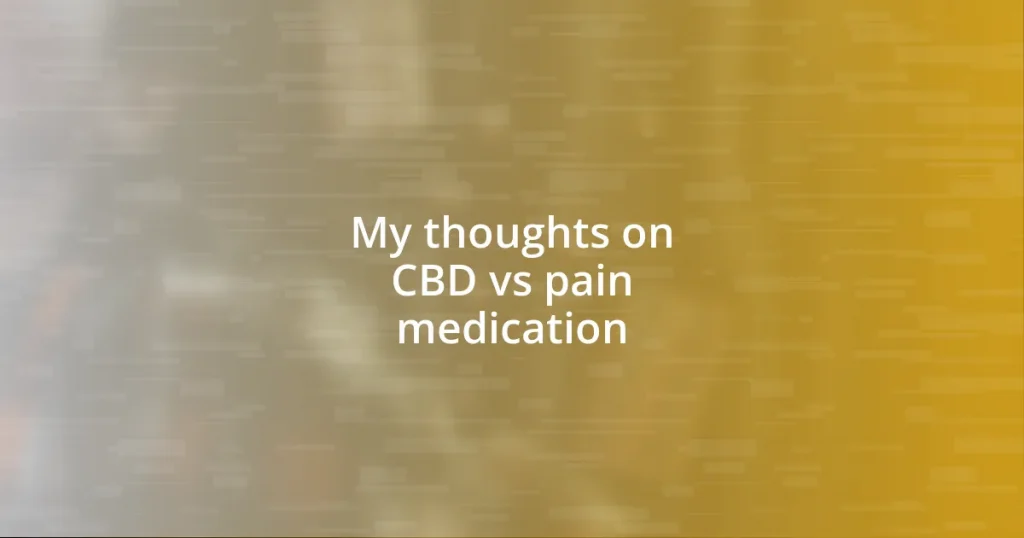Key takeaways:
- Pain is a complex experience influenced by emotional and mental states, necessitating personalized management approaches.
- Conventional pain medications like opioids are effective but carry significant risks, including dependency and side effects.
- Natural options like CBD may provide pain relief with fewer side effects, promoting overall wellness without the same level of risk associated with traditional medications.
- It’s important to reconsider pain management strategies, balancing immediate relief with long-term health and well-being.

Understanding Pain Management Options
When considering pain management options, it’s crucial to recognize the complexity of pain itself. From my experience, pain isn’t just a physical sensation; it’s deeply entwined with our emotional and mental states. Have you ever noticed how a bad day can intensify your discomfort? This insight often leads me to explore various approaches tailored to individual needs, whether that’s traditional medication or alternative methods like CBD.
Pain medications, like opioids, can be effective, but they often come with a laundry list of potential side effects and the risk of dependency. I remember a friend of mine who was prescribed opioids for chronic pain and ended up battling issues that added layers of frustration to his situation. It’s stories like this that make me think about the need for more holistic solutions, ones that prioritize not only relief but also long-term well-being.
On the other hand, I’ve witnessed the promise of natural options like CBD, which many people—myself included—find offers a more balanced approach to managing pain without the heavy baggage. Isn’t it fascinating how options can vary so widely? It’s almost like finding the right puzzle piece that fits perfectly, making the overall picture of pain management more comprehensive and personal.

Conventional Pain Medications Explained
Conventional pain medications typically include nonsteroidal anti-inflammatory drugs (NSAIDs) and opioids. While NSAIDs like ibuprofen can help with inflammation and mild pain, I’ve found them to sometimes upset the stomach if taken too frequently. On the other hand, opioids, such as morphine and oxycodone, are powerful and can provide significant relief, but I’ve seen how they can lead to dependency, which makes me hesitant to consider them, especially after hearing from friends who have struggled with addiction issues.
In my conversations with others about pain management, it’s clear that many people have mixed feelings about opioids. Yes, they can be effective, but the risks involved often overshadow the benefits. A close family member of mine once found herself in a cycle of increasing dosages to alleviate her pain, only to become trapped in a painful addiction that required years of support to overcome. This experience really opened my eyes to the importance of exploring other alternatives alongside these conventional options.
Overall, understanding the role of conventional pain medications is a balancing act between effective relief and potential risks. I believe that for those who opt for them, being aware of these dangers is crucial. It makes you wonder—can we strike a better balance between treatment effectiveness and long-term health?
| Type of Medication | Common Uses |
|---|---|
| NSAIDs | Relief from mild to moderate pain, anti-inflammatory |
| Opioids | Severe pain relief, usually after surgery or injury |
| Potential Side Effects | Stomach issues, bleeding risks |
| Dependency Risk | Low for NSAIDs, high for opioids |

Comparing CBD and Traditional Medications
When I compare CBD to traditional pain medications, I can’t help but reflect on how distinct their approaches are. CBD, for instance, seems to tap into our body’s endocannabinoid system, promoting a sense of balance without the daunting side effects that come with many prescribed medications. Have you ever tried a remedy that felt like it was simply “easing” your pain rather than truly addressing it? That’s the kind of experience people have reported with CBD – a gentler touch that often supports overall wellness.
In contrast, my encounters with traditional medications like NSAIDs and opioids remind me of walking a tightrope. While they can provide immediate relief, they do so with the looming shadow of risks, especially with long-term use. I spoke with someone who relied on prescription opioids for years. At first, they helped her cope with her post-surgery pain, but eventually, she found herself on an emotional rollercoaster, struggling to manage both her pain and her reliance on them. It’s experiences like hers that prompt me to weigh the benefits and the potential for dependency very carefully.
Exploring these options further, I’ve often wondered about the long-term implications of each choice. Does the path of least resistance—reaching for a quick medication—truly lead to the best outcomes? Personally, shifting my perspective toward something like CBD has been refreshing. It encourages me to think beyond mere symptom relief, focusing instead on a holistic approach to health and well-being. Perhaps it’s time for us to rethink what we consider effective pain management.















